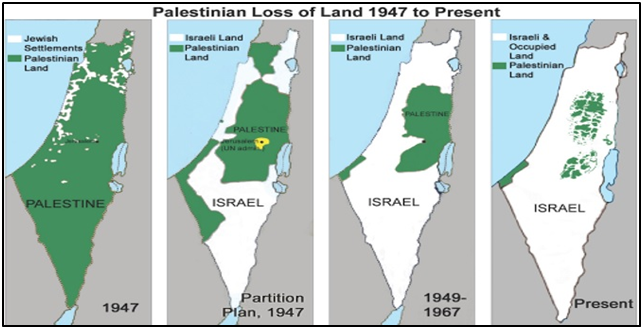Why in news? Norway, Ireland and Spain have announced that they will formally recognise the state of Palestine. The recognition of Palestine is expected to take place on May 28. This step may encourage other EU countries to do the same. This, in turn, could also lead to more action at the United Nations, further isolating Israel.
What’s in today’s article?
- Israel-Palestine conflict
- The issue of statehood to Palestine
- Ireland, Spain, Norway to formally recognise Palestine
Israel- Palestine: Synopsis of the Conflict
- Early Phase
- In the 19th century the land of Palestine was inhabited by a multicultural population (approx. 86% Muslim, 10% Christian, and 4% Jewish) – living in peace.
- In the late 1800s, a group in Europe decided to colonize this land. Known as Zionists, their goal was to create a Jewish homeland.
- They considered locations in Africa and the America, before settling on Palestine.
- Hitler’s rise to power, led to increased Jewish immigration to Palestine. With the steady influx of Jews, the conflict in Palestine started to grow.
- UN Partition Plan

- In 1947 the United Nations decided to intervene. However, it did not choose the principle of “self-determination of peoples.
- Under considerable Zionist pressure, the UN recommended giving away 55% of Palestine to a Jewish state.
- 1947-1949 War
- Fighting began almost as soon as the Resolution of November 1947 was approved.
- On May 14, 1948, day before the British Mandate (Palestine was a British colony) expired, Britain declared the establishment of a Jewish State in Eretz-Israel, to be known as the State of Israel.
- This sparked a full-scale war (1948 Arab–Israeli War).
- By the end of the war, Israel had conquered 78 percent of Palestine; and a new map was drawn up.
- Oslo peace process
- In the 1993 a breakthrough agreement was negotiated between Israeli and Palestinian leaders in Oslo, Norway.
- Under this process, the Israeli government and the Palestine Liberation Organization (PLO) agreed on a plan to implement a two-state solution.
The issue of statehood to Palestine
- Control of the Palestinian territories remains divided
- The 1948 UN decision created Israel envisaged a neighboring Palestinian state.
- However, even today, the control of the Palestinian territories remains divided and bids for UN membership have been denied.
- The Palestine Authority currently has observer status at UN.
- Current status
- Around 144 out of 193 member-states of the United Nations recognise Palestine as a state, including most of the global south, Russia, China and India.
- However, so far, only a handful of the 27 EU members have done so, mostly former Communist countries as well as Sweden and Cyprus.
- Britain, Australia and EU member Malta have indicated in recent months that they could soon follow suit.
- Increasing support in favour of Palestine
- Recently, in May 2024, 143 of 193 countries in the United Nations (U.N.) General Assembly voted for full membership to the U.N. for the State of Palestine.
- The International Criminal Court (ICC) prosecutor has sought arrest warrants for Israeli Prime Minister Benjamin Netanyahu and Defence Minister Yoav Gallant.
- Stand of Western Countries
- The United States, Britain and other Western countries have backed the idea of an independent Palestinian state existing alongside Israel.
- However, they insist Palestinian statehood should come as part of a negotiated settlement.
- There have been no substantive negotiations since 2009.
- Palestinian statehood and stand of India
- India and Palestine have had a relationship since 1974, when India became the first non-Arab state to recognize the Palestine Liberation Organisation (PLO).
- In 1988, India was one of the first countries to recognize the Palestinian State.
- In 1996, India opened its Representative Office to Palestine in Gaza City which was shifted to Ramallah in 2003.
- India has advocated the resumption of direct negotiations towards establishing a sovereign, independent and viable State of Palestine living within secure and recognized borders, side by side at peace with Israel.
Ireland, Spain, Norway to formally recognise Palestine
- Recognition to State of Palestine: Ireland, Spain and Norway announced that they would recognise a Palestinian state on May 28.
- Significance: Although the EU countries and Norway aren't recognizing a current Palestinian state, their support symbolizes a boost for the Palestinians' global image.
- This increases pressure on Israel to start peace talks.
- Also, this would mark a significant accomplishment for the Palestinians, who believe it confers international legitimacy on their struggle.
- Israel’s response: Israel reacted rapidly by recalling its ambassadors to Ireland, Norway and Spain.
- The Israeli government slams talk of Palestinian independence as a reward for the Hamas October 7 attack on southern Israel.
- It rejects any move to legitimize the Palestinians internationally.










